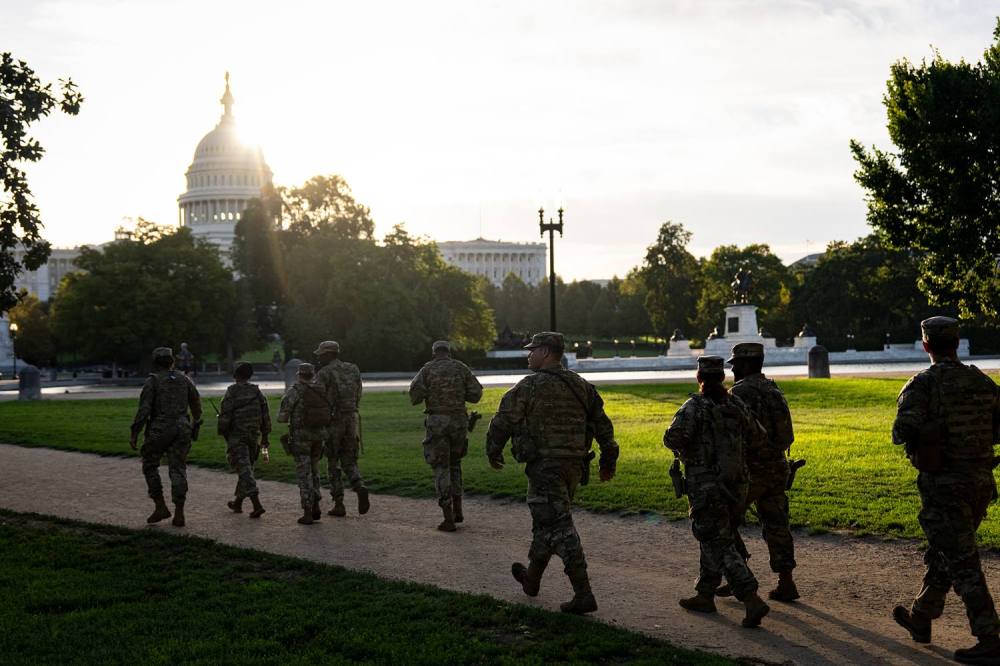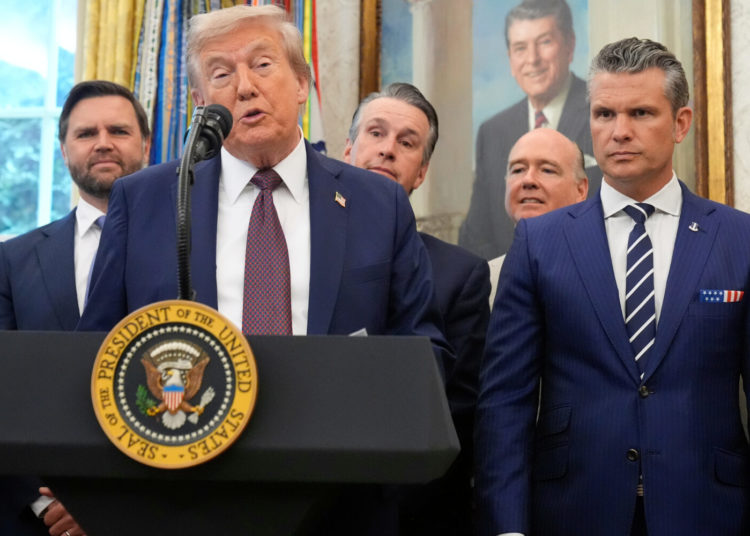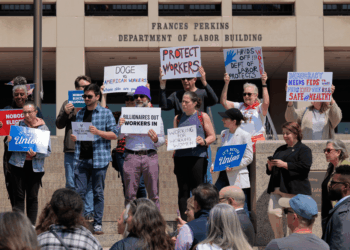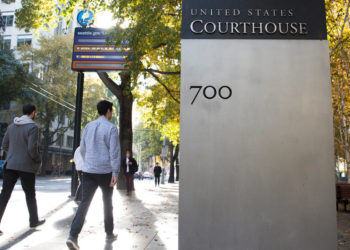Nearly one month into the U.S. federal government shutdown, foreign-policy and national security needs are being increasingly strained in subtle and not-so-subtle ways.
So far, the White House, State Department, Defense Department, and other agencies have mostly minimized the negative impacts to U.S. defense and diplomacy operations. All active-duty military personnel are still required to report for duty, and many civilian workers with national security-related jobs are working without pay during the shutdown.
But with another scheduled military payday coming up on Oct. 31, it doesn’t appear that the Trump administration has another hat trick it can pull off like it did earlier in the month to reallocate $8 billion earmarked for defense research to instead pay service members.
The Defense Department will use an anonymous donation of $130 million, reportedly from billionaire Timothy Mellon—a longtime donor to President Donald Trump—to pay some troops’ salaries. However, with it costing roughly $7.5 billion every two weeks to pay all of the roughly 1.3 million active-duty service members, many more soldiers, airmen, sailors, and Marines are expected to go unpaid. And this in a field where a high percentage of military families are already food insecure and lack the savings to absorb going without a paycheck.
Outside of the military, this shutdown has led to the furlough of many more civilians working in the defense and diplomatic sectors than past shutdowns. According to an agency-by-agency shutdown tracker compiled by the New York Times, 62 percent, or 16,651 staffers, of the State Department’s employees have been furloughed. In comparison, 45 percent (334,904 workers) of the Defense Department’s civilian workforce has been furloughed.
“The thing that is just shocking to me is how deeply into the national security infrastructure the furloughs have gone,” said Laura Holgate, a former U.S. ambassador to the International Atomic Energy Agency during the Biden administration who has held senior national security roles across multiple administrations. “All of my experience in the past with shutdowns has exempted large chunks of national security and foreign policy, because it’s not like the world stops,” she added.
The Department of Homeland Security, which has the lead in executing the Trump administration’s top-priority anti-immigration strategy, has had a much smaller share of its workforce furloughed: just 5 percent, according to the Times tracker.
Meanwhile, dozens of House Democrats this week lambasted the Energy Department’s decision to furlough nearly 80 percent of the National Nuclear Security Administration’s workforce. The NNSA is charged with overseeing maintenance of the U.S. nuclear warhead stockpile. Despite the obvious national security role that the office has, a greater share of its workforce has been furloughed compared to the rest of the Energy Department, which had 59 percent of its officials sent home, according to the Times tracker.
“From maintaining and modernizing our nuclear weapons stockpile, to overseeing the Navy’s nuclear propulsion, and managing nuclear nonproliferation programs, the United States is safer because of the dedicated public servants at NNSA,” reads an Oct. 27 letter from 26 Democratic lawmakers that was sent to the energy secretary. “These federal employees play a critical oversight role in ensuring that the work required to maintain nuclear security is carried out. …Undermining the agency’s workforce at such a challenging time for U.S. global leadership diminishes our credible deterrence, emboldens our international adversaries, and makes the world a more dangerous place.”
An NNSA spokesperson, who was not authorized to be quoted , said in an email that all of the office’s security personnel “remain on duty” and that “production operations continue at all NNSA labs, plants, and sites.”
With so many national security agencies going without large chunks of their workforces for nearly a month, it’s inevitable that many routine actions aren’t taking place, and some projects are falling behind schedule. But getting specifics about what nonclassified agency actions have been reduced or frozen is difficult.
One pipeline for public transparency, congressional oversight that has largely fallen to Democrats to conduct during the second Trump administration, has been squeezed to a trickle, particularly on the State Department side. Sen. Jeanne Shaheen, the top Democrat on the Foreign Relations Committee, said at a committee hearing last week that more than 90 percent of the State Department’s legislative affairs office remains furloughed.
The State Department said it is continuing critical consular and diplomatic activities, including supporting Trump and Secretary of State Marco Rubio’s official travel this week to Malaysia, South Korea, and Japan.
While “certain domestic support” for consular operations has been suspended, other consular operations—including passport and visa services as well as assistance for U.S. citizens abroad—continues, a State Department spokesperson, who was not authorized to be named, said over email. “Our work to represent the American people and advance the America First foreign policy agenda has not stopped.”
“It’s just back to the boiling frog analogy that seems to be on everyone’s lips these days,” Holgate said. “The less capable the U.S. government is, the less effective it is going to be.”
U.S. diplomats stationed overseas are especially exposed to the financial penalties of the shutdown.
“Many Foreign Service families are dependent on single incomes. It can be hard to find a job when you are with your spouse overseas. So, when that one spouse isn’t getting paid, it’s a double challenge,” said Nikki Gamer, the communications and outreach director for the American Foreign Service Association (AFSA), the union for U.S. diplomats.
The union has been collecting anonymous anecdotes from its members, who prior to the shutdown already reportedly faced a retaliatory climate for expressing concerns with elements of the administration’s foreign policy.
“This is extremely wasteful of the taxpayers’ dollar,” one unnamed U.S. diplomat was quoted by AFSA as saying. “Hundreds of Foreign Service officers are receiving per diem to be in DC for training, but not receiving said training. Likely, the majority will have to [move on to our assignments] without the necessary training to do our jobs. We will then have to learn on the job, slowing down our teams at post, and rendering our overseas missions less effective.”
Some agency officials are working in shifts throughout the shutdown, with one team reporting to the office one week while the other is furloughed and then switching the next week. But that offers its own paycheck complications during an extended shutdown.
“Some of us are rotating furlough,” another official was quoted by AFSA as saying. “This may mean that we are not able to claim unemployment benefits permitted to those who are furloughed entirely.”
In other areas, the financial impacts of the shutdown are falling unevenly based on where one lives. For example, NATO ally Germany has stepped in to advance the October salaries of some 12,000 U.S. civilian employees working at U.S. military bases in the country at a cost of roughly 40 million euros (about $47 million), with the expectation that Berlin will be repaid when the shutdown ends. And the U.S. Army is unilaterally extending—by 45 days—the service contracts of soldiers who would otherwise be exiting the military.
But one critical area of soft diplomacy is not being put at risk because of the shutdown. Beijing’s furry, corpulent, and altogether hapless large mammal ambassadors stationed at the Smithsonian National Zoo in Washington, D.C., will be fed and cared for throughout the shutdown.
The post U.S. Government Shutdown Sorely Tests National Security State appeared first on Foreign Policy.




